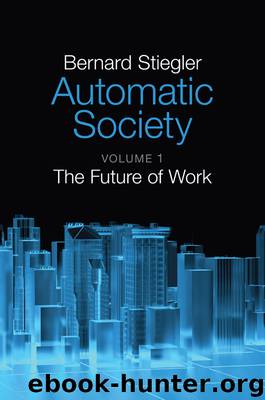Automatic Society by Bernard Stiegler

Author:Bernard Stiegler
Language: eng
Format: epub
Publisher: Wiley
Published: 2017-01-05T16:00:00+00:00
5
Within the Electronic Leviathan in Fact and in Law
Knowledge […] is one of the ways by which humanity seeks to take control of its destiny and to transform its being into a duty.
Georges Canguilhem1
61. Disparation and signification
Berns and Rouvroy relate the automated processes implemented by algorithmic governmentality to Félix Guattari's concepts of molecular machinic unconscious and machinic enslavement. The example used by Guattari for machinic enslavement is, in fact, ‘driving in a state of reverie’.2 But he does not elaborate on the reverie that accompanies this kind of enslavement.
Driving my car ‘automatically’, that is, ‘without thinking’ and in this sense ‘unconsciously’, one ‘part’ of ‘me’ is totally enslaved to an engine and a mechanical vehicle that it ‘serves’ by ‘using it’ [en ‘s'en servant’], while an ‘other’ part of ‘me’ – which is, however, perhaps not completely me or my ego, but rather also this obscure zone of intermittences that is the id – finds itself in a greatly dis-automatized mode: the mode of reverie, akin at times to floating attention, which is always at the origin of thinking that goes off the beaten track.
The automatisms that accompany this dis-automatization thus belong to what Guattari called the machinic unconscious, where the latter is ‘a-signifying’, as Berns and Rouvroy recall by citing a commentary of Maurizio Lazzarato, and by emphasizing that in algorithmic governmentality, as in the machinic unconscious and in the enslavement through which it is carried out, ‘everything happens as if signification was not absolutely necessary’.3
Signification [signification], that is, semiosis as engendering signs, significations and significance (making-signs), is the transindividual made possible by the process of transindividuation woven between psychic systems, technical systems and social systems – that is, between psychic individuations, technical individuation and collective individuations.4
The destruction of signification by the digital technical system results from the technology of power deployed by the algorithmic governmentality of 24/7 capitalism, and it is founded on eliminating processes of disparation. The latter is a concept that Simondon introduces in the following terms:
Each retina surveys a two-dimensional image; the left image and the right image are disparate; they represent the world seen from two different perspectives […]; some details hidden from view in the left image are, on the contrary, revealed in the right image, and vice versa […]. No third image is optically possible that could unify these two images: they are essentially disparate and cannot be superposed within the axiomatic of two-dimensionality. To bring about a coherence that incorporates them, it is necessary that they become the foundation of a world perceived within an axiomatic in which disparation […] becomes, precisely, the index of a new dimension.5
Download
This site does not store any files on its server. We only index and link to content provided by other sites. Please contact the content providers to delete copyright contents if any and email us, we'll remove relevant links or contents immediately.
Whiskies Galore by Ian Buxton(40292)
Introduction to Aircraft Design (Cambridge Aerospace Series) by John P. Fielding(32328)
Small Unmanned Fixed-wing Aircraft Design by Andrew J. Keane Andras Sobester James P. Scanlan & András Sóbester & James P. Scanlan(32135)
Craft Beer for the Homebrewer by Michael Agnew(17439)
Turbulence by E. J. Noyes(7031)
The Complete Stick Figure Physics Tutorials by Allen Sarah(6630)
Kaplan MCAT General Chemistry Review by Kaplan(6044)
The Thirst by Nesbo Jo(5777)
Bad Blood by John Carreyrou(5760)
Learning SQL by Alan Beaulieu(5399)
Weapons of Math Destruction by Cathy O'Neil(5027)
Man-made Catastrophes and Risk Information Concealment by Dmitry Chernov & Didier Sornette(4728)
iGen by Jean M. Twenge(4692)
Digital Minimalism by Cal Newport;(4509)
Life 3.0: Being Human in the Age of Artificial Intelligence by Tegmark Max(4492)
Audition by Ryu Murakami(4091)
1,001 ASVAB Practice Questions For Dummies by Powers Rod(4034)
Electronic Devices & Circuits by Jacob Millman & Christos C. Halkias(4019)
Pale Blue Dot by Carl Sagan(3995)
